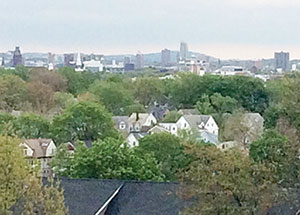
Definitions for “Neighborhood Council” and “Neighborhood Advisory Committee” were discussed by the Board of Aldermen’s Legislative Matters Committee last Thursday. — Photo by Bobbie Toner
By Jordan Deschenes
At its meeting last Thursday, the Legislative Matters Committee further discussed the proposed Community Benefits Ordinance, calling for a “meeting of the whole” to include input from all the city’s aldermen. The Committee finished reviewing its current draft version of the ordinance, but still have yet to discuss suggested alterations in a community draft.
“The draft is before us, but it is not etched in stone,” said committee chair Mary Jo Rossetti at the start of the discussion.
The Committee notably skipped over several major portions of the draft due to the fact that they had been altered or revised through community input. Aldermen generally agreed that it would be counterproductive to the meeting to review these particular sections because they needed to be reviewed by the city’s Legal Department first.
Union Square residents contributed heavily to the revised community draft. The passage of the CBC ordinance would be the only means for the Union Square Redevelopment Covenant to be recognized as an entity eligible to receive Community Benefits funds.
“This is not a draft ordinance that relates to Union Square solely. This will be for Union Square and any large development that proceeds thereafter. It happened to be lead and driven by the community in Union Square, but nowhere in the draft document is it specific to Union Square,” said Rossetti.
Alderman Rossetti suggested that the legally approved draft should include multi-colored revisions, with the original administration’s draft in black, citizen changes in red, and legal alterations in blue.
Definitions for “Neighborhood Council” and “Neighborhood Advisory Committee” were discussed at length. One of the main concerns among the Aldermen was the specific role of the Advisory Committee in relation to individual Neighborhood Councils and the CBC itself.
“If there is not a self organized interim Neighborhood Council, there will be a Neighborhood Advisory Council appointed by the mayor so that the neighborhood has the ability to assess its needs regarding community benefits and submit for funding requests,” said Eileen McGettigan, Special Counsel at the Office of Strategic Planning and Community Development (OSPCD).
As it is currently written, the Neighborhood Advisory Committee will serve individual neighborhoods “in the absence of a recognized neighborhood council” on a citywide basis by helping identify benefits needs and priorities.
The Committee came to an agreement that the role of the Advisory Council would be secondary to those of both the CBC and individual Neighborhood Councils.
“It was meant to be a default. It wasn’t meant to supersede,” explained Michael Glavin, Executive Director at the OSPCD.
At the very end of the meeting, Union United member Van Hardy was invited to the podium to speak on behalf of the group. Union United advocates for the creation of “tangible benefits” for low-income Union Square businesses and residents that might be displaced as a result of the area’s redevelopment process.
Hardy had two main requests as he addressed the room, the first being that individual neighborhood councils should be given more power relative to the citywide CBC.
“Our goal is trying to build up the neighborhood councils so they have agency,” said Hardy.
“We’re basically trying to create a neighborhood council that can be hyper local and at the same time, have the CBC at a citywide level.”
Hardy questioned committee members about the restrictions on which grant funds could be spent, pointing to language in the draft ordinance that suggests the restriction of funds for displacement mitigation purposes only. He asked the committee as whether community benefits funds could be used for public purposes other than displacement mitigation.
“That’s a legal point that I think we need to look at. If you have a mitigation fund that is established, then you can use it for any public purpose, constant with the law,” said Alderman William White Jr. “It’s different than if you levy against a developer by statue.”
Union Square Associates, a development team partnered with the city, will be in charge of the Union Square redevelopment. The group is currently applying for zoning permits, with a deadline at the end of May.
Alderman Rossetti suggested that the ordinance might be passed by then, but could also be pushed back to early June if the process is delayed for any reason.












Reader Comments